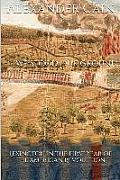Lexington and the “subtle, wicked ministerial plan”
Last week I analyzed the accounts of tea burning in Marshfield 250 years ago and concluded that I found no strong evidence for the exact date of this event.
Marshfield was notable for being split between Whigs and Loyalists. It had an Anglican church as well as the Congregationalists. The control of town meeting teetered back and forth between factions. The tea-burning, whenever it happened, wasn’t an official act.
In contrast, the town of Lexington was militantly Whig. Its minister, the Rev. Jonas Clarke, supported that stance. Early on, the town voted to create a committee of correspondence to share news and views with Boston and elsewhere—a litmus test for radicalism.
On 13 Dec 1773, as the crisis over the East India Company cargoes in Boston heated up, Lexington called a town meeting. Charles Hudson’s town histories published the record, and Alexander Cain, author of We Stood Our Ground: Lexington in the First Year of the American Revolution, has shared more exact transcriptions at Untapped History. I drew the quotations that follow from a combination of those sources.
Lexington’s committee of correspondence produced a blistering statement about the Tea Act:
After the meeting unanimously approved those statements, someone proposed another:
TOMORROW: What happened next.
Marshfield was notable for being split between Whigs and Loyalists. It had an Anglican church as well as the Congregationalists. The control of town meeting teetered back and forth between factions. The tea-burning, whenever it happened, wasn’t an official act.
In contrast, the town of Lexington was militantly Whig. Its minister, the Rev. Jonas Clarke, supported that stance. Early on, the town voted to create a committee of correspondence to share news and views with Boston and elsewhere—a litmus test for radicalism.
On 13 Dec 1773, as the crisis over the East India Company cargoes in Boston heated up, Lexington called a town meeting. Charles Hudson’s town histories published the record, and Alexander Cain, author of We Stood Our Ground: Lexington in the First Year of the American Revolution, has shared more exact transcriptions at Untapped History. I drew the quotations that follow from a combination of those sources.
Lexington’s committee of correspondence produced a blistering statement about the Tea Act:
…the Enemies of the Rights & Liberties of Americans, greatly disappointed in the Success of the Revenue Act, are seeking to Avail themselves of New, & if possible, Yet more detestable Measures to distress, Enslave & destroy us.The committee proposed six resolves to steer the town away from this horrible fate. These included:
Not enough that a Tax was laid Upon Teas, which should be Imported by Us, for the Sole Purpose of Raising a revenue to support Taskmasters, Pensioners, &c., in Idleness and Luxury; But by a late Act of Parliament, to Appease the wrath of the East India Company, whose Trade to America had been greatly clogged by the operation of the Revenue Acts, Provision is made for said Company to export their teas to America free and discharged from all Duties and Customs in England, but liable to all the same Rules, Regulations, Penalties & Forfeitures in America, as are Provided by the Revenue Act. . . .
Once admit this subtle, wicked ministerial plan to take place, once permit this tea, thus imposed upon us by the East India Company, to be landed, received, and vended by their consignees, factors, &c., the badge of our slavery is fixed, the foundation of ruin is surely laid; and, unless a wise and powerful God, by some unforeseen revolution in Providence, shall prevent, we shall soon be obliged to bid farewell to the once flourishing trade of America, and an everlasting adieu to those glorious rights and liberties for which our worthy ancestors so earnestly prayed, so bravely fought, so freely bled!
2. That we will not be concerned either directly or indirectly in landing, receiving, buying, or selling, or even using any of the Teas sent out by the East India Company, or that shall be imported subject to a duty imposed by Act of Parliament, for the purpose of raising a revenue in America.Other resolves endorsed everything the Bostonians were doing and condemned the tea consignees, even naming Richard Clarke and the Hutchinson brothers.
3. That all such persons as shall directly or indirectly aid and assist in landing, receiving, buying, selling, or using the Teas sent by the East India Company, or imported by others subject to a duty, for the purpose of a revenue, shall be deemed and treated by us as enemies of their country.
After the meeting unanimously approved those statements, someone proposed another:
That if any Head of a Family in this Town, or any Person, shall from this time forward; & until the Duty taken off, purchase any Tea, Use or consume any Tea in their Famelies, such person shall be looked upon as an Enemy to this town & to this Country, and shall by this Town be treated with Neglect & Contempt.Now they were getting personal.
TOMORROW: What happened next.


No comments:
Post a Comment